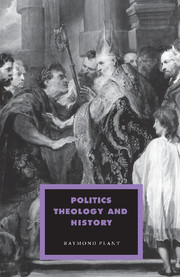Book contents
- Frontmatter
- Contents
- Preface
- 1 Liberal society and political theology
- PART I THE POSSIBILITY OF POLITICAL THEOLOGY
- PART II THE SITE OF POLITICAL THEOLOGY
- Introduction
- 7 Markets, morality and theology
- 8 Social justice, freedom and the common good
- 9 Human rights, human dignity and the scope of responsibility
- 10 Self and community
- PART III LIBERALISM, RELIGION AND SOCIAL UNITY
- Select bibliography
- Index of names
- Index of subjects
- CAMBRIDGE STUDIES IN IDEOLOGY AND RELIGION
10 - Self and community
Published online by Cambridge University Press: 23 November 2009
- Frontmatter
- Contents
- Preface
- 1 Liberal society and political theology
- PART I THE POSSIBILITY OF POLITICAL THEOLOGY
- PART II THE SITE OF POLITICAL THEOLOGY
- Introduction
- 7 Markets, morality and theology
- 8 Social justice, freedom and the common good
- 9 Human rights, human dignity and the scope of responsibility
- 10 Self and community
- PART III LIBERALISM, RELIGION AND SOCIAL UNITY
- Select bibliography
- Index of names
- Index of subjects
- CAMBRIDGE STUDIES IN IDEOLOGY AND RELIGION
Summary
The distinction between the individual and his creed is a foundation truth of democracy, and any community that seeks to blur it will not do itself any favours.
(Salman Rushdie, The Observer)In this chapter, I shall focus on the issue of the relationship between the individual and community within liberal political theory. The claim that liberal societies are neglectful of the idea of community is an old one. Certainly, religious believers have shared this critique of liberal society, as we saw in the first chapter. Having said that, it is also true to say that the Christian tradition is not univocal on this point. There have been strong defences of what might be thought of as liberal individualism from within the Protestant tradition particularly and, of course, this tradition contributed enormously to the growth of the idea of individualism in Western societies. A good and, indeed, famous example of a defence of liberal individualism and its proper relationship with the Christian faith can be found in Das Wesen des Christentums by Harnack. Writing in the third chapter, composed exactly one hundred years ago in the winter session of 1899–1900 at the University of Berlin, Harnack said:
The Kingdom of God comes by calling to individuals, making entrance into their souls and being grasped by them. The Kingdom of God is indeed God's rule – but it is the rule of a holy God in individual hearts. It is God himself in his power. Everything dramatic, all public historical meaning vanish here … It is not a matter of angels and devils, principalities and powers, but of God and the soul, of the soul and its God.
- Type
- Chapter
- Information
- Politics, Theology and History , pp. 257 - 296Publisher: Cambridge University PressPrint publication year: 2001

